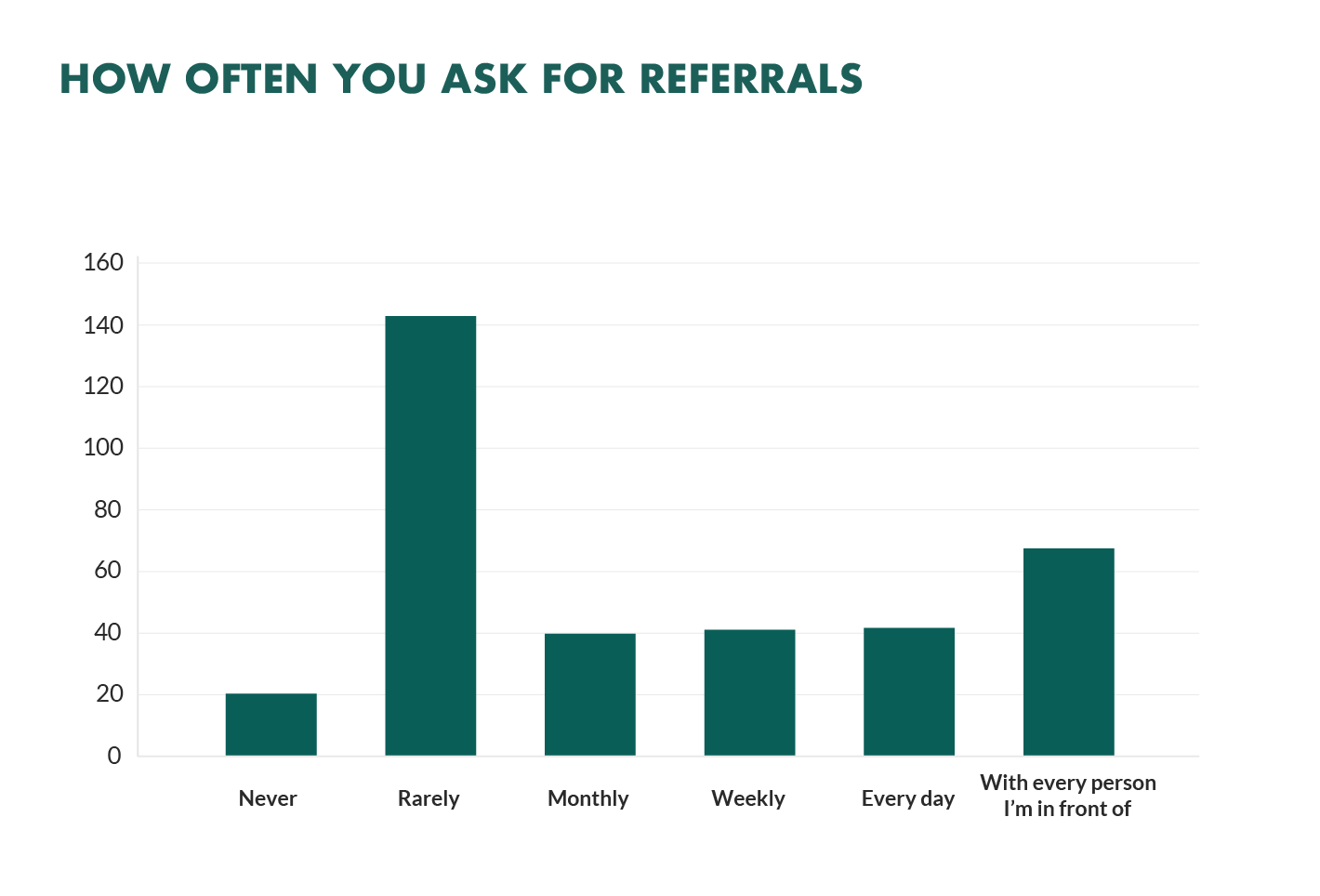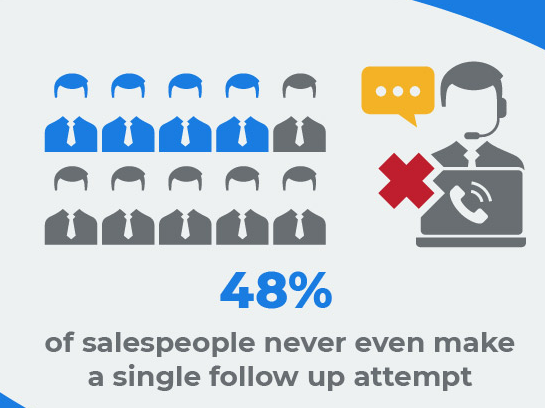Ask any competitive salesperson, and they’ll always tell you that there’s another level to reach. Even if a salesperson has hit or exceeded their quota, they’re likely the type of person who wants to keep striving for more and hitting new goals.
The good news for current and aspiring sales performers is that there are certain habits that the top sales performers have in abundance that allow them to excel and even double or triple their income.
This article will uncover ten secrets of top sales performers that’ll allow you to grow your sales career and boost your income.
10 secrets of top sales performers:
- Track metrics closely
- Follow up with prospects
- Value prospects' and customers' time
- Not afraid to ask for referrals
- Follow a measurable, repeatable process
- Believe in the product and understand the prospects
- Ask good questions
- Look to build long-term relationships
- Understand how the products work
1. Top performers track their metrics closely
Everything in sales can be tracked and measured, and top sales performers will know what metrics their performance is judged upon.
Measuring sales metrics goes a long way to uncovering the reasons as to why a particular salesperson is performing well or not, any areas they could improve on and whether they are using their time effectively.
Most sales individuals and sales teams will ultimately be measured on how many deals they close and how much revenue they bring into the business they work for. These two measurements can be broken down further into common sales metrics that organizations track. Some of these are:
- Total revenue a salesperson or team brings in
- Win rate (the number of deals they close, compared to the number of prospects they demonstrate
to). - Average deal size
- The expected lifetime value of a new customer who’s been sold to
- Quota attainment often displayed as a percentage
- Calls, emails, messages sent
- Pipeline coverage or the number of expected deals in the pipeline
- How many appointments/demos they have booked or generated
Alongside tracking their metrics, smart sales and marketing professionals will always be looking for different solutions that can help them improve their performance or streamline their sales process.
For example, if a salesperson is sending emails manually to new prospects, they could look at implementing an email marketing platform to automate the process of sending emails. Or, if they’re working remotely, they’ll consider the best remote sales tools to help them work more efficiently.
2. Top sellers follow up with prospects
Did you know 48% of salespeople never attempt a single follow-up after initially contacting a prospect? That should fill you with hope, particularly if you're new to sales. Even following up once with a prospect differentiates you from 48% of the other salespeople out there.
Another interesting statistic to note is that 60% of customers say 'no' at least four times before saying 'yes' to an offer, and 80% of sales require at least five follow-up calls. What these stats should tell you is that you are respectful but persistent when you're following up with leads.
You can also get creative with your follow-ups, don't be afraid to send your prospects custom content such as personalized videos to stand out from the crowd.
3. They value their prospects' and customers' time
There's nothing worse for a prospect who books a meeting or demo with a salesperson only to have them not show up. Particularly if the sales rep cancels without letting them know or spends too much of the call talking about parts of the product or solution that aren't relevant to the prospect's situation or the problem they're looking to solve.
In most situations, a potential customer will book a demo, pick up the phone to call a business or walk into a store because they are interested in a particular product and want to know what that product can do for them and if it can solve the problems they're experiencing and ultimately improve their life. Top sales performers are aware of this and do their best to keep the sales demo or call focused on the prospect’s wants and needs.
To make sure you stay on track when speaking to potential customers, try keeping a bullet point list of points you want to cover. You can post this list on your computer screen, or wherever you can, so you can glance at the list during your call to make sure you're staying on target. You can also outline at the beginning of the call what you'll be covering to the prospect so they know what to expect.
Following these couple of easy-to-implement tips will help you stay on track and not waste anyone's time during your sales calls.
4. They aren’t afraid to ask for referrals
Alongside staying on point in their sales conversations, the top sales performers aren't afraid to ask who they're speaking to for a referral, particularly prospects who buy from them.
If a prospect is happy with the solution you're offering and the way you've explained it to them, there's a strong chance they may know other people within their personal or professional networks who may also benefit from the solution or product you're offering.
The most active sales performers will even ask potential customers who say no to their offer for a referral. Anyone who's worked in sales can know how difficult it can be to build a viable customer base, so the best sales performers will utilize every avenue possible to get hold of a potential new customer.
The stats surrounding referrals also show why they are so important. Here are some of the most eye-catching:
- 92% of consumers trust referrals from people they know
- Friends' social media posts influence 83% of US online shoppers
- Referral leads have a 30% higher conversion rate than leads from any other channel

5. They follow a measurable, repeatable process
The top sales performers will have a process they follow that moves as many prospects down the funnel towards a close as possible. This could involve having a system with specific processes in place, such as:
- Having a calendar booking system in place so prospects can easily see when the salesperson is available
- Having set prospecting times each week to drum up new business
- Set times to dedicate towards following up with prospects
The processes that top-performing salespeople follow are generally also measurable. They can see what’s working and what’s not in the process and continually optimize to ensure the process is as streamlined as possible to ensure maximum success.
6. They believe in the product they’re selling and understand their prospects
Real enthusiasm for a product is hard to fake. When a salesperson believes in the value of the product they’re selling and truly believes that it can help the prospect they are speaking to and will actually solve their problems.
Top sales performers take the time with each potential client to truly understand why they are seeking out their solution and what their top priorities and concerns are. Knowing this information, the salesperson will tailor their approach to each and every prospect.
Taking this approach helps put the prospect at ease and increases the feeling that the salesperson is actually trying to help them rather than just selling to them.
7. Top performers in sales ask good questions
Arguably the most important part or process of any sales conversation is the salesperson taking the time to ask the prospect questions at different stages of the conversation.
When a salesperson asks a prospect the right questions, they begin to uncover the concerns, desires and motivation that the prospect has. This information allows them to craft a story that positions their product as the solution to their prospects' problems while positioning and explaining the product in a way that eases their concerns.
Asking questions at the right time is also a method that top sales performers use to keep the conversation going with a prospect.
Even simple questions can be useful for ascertaining where a prospect stands and to check to see if they've gotten value from seeing the product that the salesperson is showing them and if they've understood everything that's been discussed.
Example questions include: Did that all make sense? Was this demonstration useful for you? Do you have any questions? Do you need anything repeated or anything explained in more detail?
8. They look to build long-term relationships
No one likes the feeling of being ‘sold to’. You tend to associate this type of feeling with disingenuous salespeople who are constantly pushing for the ‘hard sell’.
Instead, you’re more likely to buy from a salesperson who respects your time, understands your concerns, and seeks to ease them without necessarily pushing for the sale.
The salespeople who take this second approach tend to value long-term relationships with their prospects. Some products, particularly platforms such as a CRM or an Applicant Tracking System, can have relatively long sales cycles, so it’s in the best interests of a salesperson selling this type of software to foster long-term relationships with their prospects.
Even when selling a product with a short sales cycle, a top sales performer will still value the long-term relationship with a prospect; they will know that happy prospects and customers are more likely to refer new business their way or upgrade or buy from them again in the future.
9. They understand how the products they’re selling work
A salesperson's knowledge of their product can make or break many of their potential deals.
Today, consumers have more choices than ever before, and top sales performers understand this and ensure that they know their product inside out and are confident about whether it is genuinely valuable to their prospects. In addition, top sales performers aren't afraid to tell a prospect if they're not a good fit for their product.
A top sales performer also understands that selling a product to a potential customer who isn't a good fit for their product can be detrimental in the long run and ruin a potential profitable long-term relationship.
10. Top sales performers never stop learning
As we just looked at, top sales performers possess a strong knowledge of how their products work and the value they bring. To acquire this knowledge, sales performers need to constantly be educating themselves on the features and benefits of the products they’re selling, particularly if the product changes regularly or has new features added to it.
For example, a salesperson selling business insurance may have to be aware of any changes in the law that could affect the insurance they’re selling and relay these changes to any prospects they’re selling to.
Wrapping it up
As the old saying goes, sales is a numbers game and building a successful career in sales requires grit, determination and a strong desire to succeed.
If you’re currently building your sales skills, then studying, imitating and most importantly, implementing the habits and skills of top sales performers is a fantastic way to start getting ahead of your competition.
Take the points we’ve covered in this article into consideration, and you’ll be well on your way to building success in your sales career.





